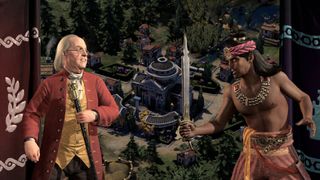Civilization 7's leaders represent a major break with the series' traditions, in that they're completely separated from the civilization you choose. You can mix and match with total freedom. Want Ben Franklin to lead the Romans? Sure. Pharaoh Hatshepsut at the head of the Mayans? You bet. However, while you'll choose a new civilization for each of the three acts, your leader will remain the same throughout. So picking one is the most consequential playstyle choice you'll make before starting that first turn.
Leaders also come with a couple attributes, which can include Cultural, Diplomatic, Economic, Expansionist, Militaristic, and Scientific. These open up special perk trees you'll unlock as you go that are similar to civics in past Civ games. It's unclear at this point whether each leader will only get perk points in their listed attributes, or if they just get those types of points more often. However, everyone can get Wildcard points, which you can spend in any tree.
Here are all of the leaders we know about so far:

Emerging victorious after a period of civil war that kicked off after the death of his adoptive uncle, Julius Caesar, Augustus played a strong PR game and became recognized as the first true Roman Emperor.
Unique ability: Imperium Maius. +2 Production in the Capital for every Town. Can purchase Culture Buildings in Towns. +50% Gold towards purchasing Buildings in Towns.
Our advice: Towns in Civ 7 are not quite full cities, as they don't have a production queue, but can be improved by spending gold. This is even cheaper for Augustus, and his bonuses encourage you to have many Towns to feed the production of the Capital. All roads lead to Rome, as it were. It seems like a really fun playstyle, reminiscent of Civ 5's Venice, which still remains probably my favorite civ in the series.

Hailing from what is now Nigeria, she ruled over the city-state of Zazzau in the late 1500s and early 1600s. She expanded the city's territory greatly through a series of offensive wars.
Unique ability: Warrior-Queen of Zazzau. +1 Resource Capacity in Cities. +1 Gold per Age for each Resource assigned to Cities. +5 Combat Strength on all Units in Plains and Desert.
Our advice: It seems like Zazzau will be a strong pick for making money and winning early wars (assuming you can fight in flat terrain). You'll also likely want to get trade going fairly early to be able to fill all of those extra resource slots.

At the head of the Maurya Empire, he ruled over most of the Indian Subcontinent in the 200s BCE. He was a major promoter and proponent of Buddhism, and considered one of India's greatest emperors even today.
Unique ability: Dhammaraja. +1 Food in Cities for every 5 excess Happiness. +10% Food in all Settlements during a Celebration. All Buildings gain a +1 Happiness Adjacency for all Improvements.
Our advice: India is often a food and population boom civ in these games, and it seems like Ashoka can turn any civ he leads into one fairly easily. Grow fast and remain stable with happiness bonuses. This is even more important in Civ 7, since you need population growth to build improvements.

A Corsican army officer who rose through the ranks to eventually become Emperor of France and conquer much of Europe. In Civ 7, like some leaders in Civ 6, you'll actually be able to play two different versions of Napoleon: "Emperor" Napoleon, focusing on his rule, and "Revolutionary" Napoleon, focusing on his military prowess.
Attributes (Emperor): Economic, Militaristic Attributes
Attributes (Revolutionary): Cultural, Militaristic
Unique Ability (Emperor): Empereur des Français. Reduces the Trade Route capacity for a target civilization and causes massive Grievances. Gets bonus Gold per Age for every leader he's Unfriendly or Hostile with, but less Gold per Age for every leader who sees him as Friendly or Helpful.
Unique Ability (Revolutionary): La Grande Armée. Gives all army commanders extra movement and granting Culture each time he defeats an enemy unit.
Our advice: Emperor Napoleon sounds like a lot of fun for an experienced player, since he's all about picking fights. His ability is extremely powerful too, to make up for the fact that you're going to want everyone to hate you most of the time. If you want a little bit less of a chaotic campaign, his Revolutionary persona simply offers some straightforward ways to pump up your culture when fighting.

Possibly the most important figure in Chinese philosophy, he was born in the 500s BCE and gave rise to a school of thought that is still influential today. He was big on obeying your parents, however, which has not ingratiated him to the pop-punk community.
Unique ability: Keju. Increased Growth Rate in Cities. Increased Science from Specialists.
Our advice: Like India, China has often been a civ focused on growth in this series, but also science. Since in Civ 7 you will often be making a choice between building a new improvement or assigning a specialist, it seems like Confucius will favor playing tall, with less sprawl and more dense city centers.

One of the Founding Fathers of the United States, he was critical in securing France's support during our War of Independence. He's also credited with a number of inventions including bifocals and the Franklin stove.
Unique ability: TBA

Far superior to that Greek nerd Cleopatra, whose family merely inherited Egypt after Alexander conquered it using the army he inherited from his dad, Hatshepsut was one of the only ethnically Egyptian women to, during the 1400s BCE, rule as pharaoh in her own right. She built a bunch of cool stuff and presided over a time of prosperity.
Unique ability: God's Wife of Amun. Adds Culture for every imported Resource. Increased Production towards the construction of Buildings and Wonders in Cities adjacent to Navigable Rivers.
Our advice: Hatshepsut likes to build and trade. However, her bonuses are heavily dependent on geography, which is going to play a big role in where you choose to settle your cities. More than other rulers, it seems, she may be reliant on picking a civilization that has harmonious bonuses to get the most out of her abilities.

A figure of some obscurity, Himiko ruled over one of what were, at her time in the 100s/200s CE, many kingdoms in the archipelago we now know as Japan. She was described as a "Priest-Queen" and the name of her domain, Yamatai, may be related to the later Yamato, the kingdom that eventually gave rise to the nation of Japan.
Unique ability: TBA

A chief of the Shawnee people, Tecumseh organized a grand confederacy of North American indigenous nations that represented one of the most significant attempts at resisting the Westward expansion of the young United States. While his confederacy was eventually defeated at the Battle of Tippecanoe, he is still seen as an anti-colonialist hero today.
Unique ability: Nicaakiyakoolaakwe. Increases Food, Production, and Combat Strength based on the number of allied City-States.
Our advice: True to his historical alliance-building, Tecumseh is going to want to unite lots of smaller powers across the map into a strong confederation. Food and production are good for everyone, but the bonus to combat strength will especially help players going for a militaristic playstyle.
We've only seen a handful of Civ 7's leaders so far, so keep an eye out as Firaxis reveals more and we ponder how best to play them. A lot more than the way leaders work is changing, too: Here's everything we learned about Civilization 7 after visiting Firaxis to play it ourselves.

 2 months ago
119
2 months ago
119







![Anime Reborn Units Tier List [RELEASE] (November 2024)](https://www.destructoid.com/wp-content/uploads/2024/11/anime-reborn-units-tier-list.jpg)

